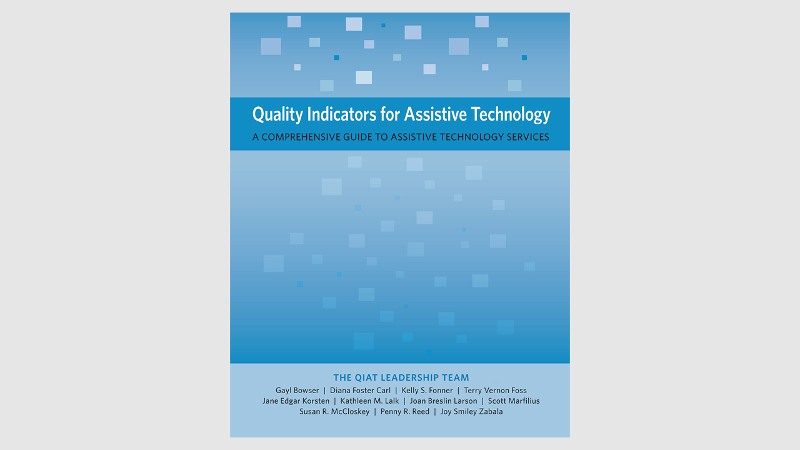CAST Publishes Quality Indicators for Assistive Technology

CAST, 2015
Date:
Wednesday, October 14, 2015
CAST Professional Publishing announced today the publication of a print version of Quality Indicators for Assistive Technology: A Comprehensive Guide to AT Services, with an EPUB version to reach the market soon. Print orders include generous bulk discounts.
Written by the Quality Indicators Leadership Team, this new publication provides the education field with a valuable and credible resource for evaluating, choosing, deploying, and supporting assistive technology services in K-12 and postsecondary educational environments. Audiences for this book include:
- Assistive technology service providers as they evaluate and constantly improve their services;
- Consumers of assistive technology services, including students and parents, as they seek adequate assistive technology services which meet their needs;
- Universities and professional developers as they conduct research and deliver programs that promote the development of the competencies needed to provide quality assistive technology services; and
- Policy makers as they attempt to develop judicious and equitable policies related to assistive technology services.
Kursten Dubbels, Assistive Technology Specialist for the Minnesota Department of Education, says, “The Quality Indicators for Assistive Technology fill a tremendous need in the education field for clear, practical standards to guide AT choices and implementation. Anyone interested in AT services will want to have this powerful, professional, and family-friendly resource."
Bill East, Execuitve Director of the National Association of State Directors of Special Education, adds: “Users of this guide will benefit from work developed over years with input from stakeholders dedicated to ensuring appropriate AT devices for individuals with disabilities. This comprehensive guide should be used by families, IEP teams, administrators and others working with individuals in need of AT.”
And Jackie Chatman, Special Education Director in Shawnee Mission, Kansas, writes: “Initially, we struggled to develop a comprehensive plan until we discovered the Quality Indicators for Assistive Technology. We immediately relied on the indicators as the foundation of all our future planning. Without the Quality Indicators for Assistive Technology and the resources available on the QIAT website we would have never been able to develop such a seamless system in addressing our students’ assistive technology needs."
The development of the Quality Indicators for Assistive Technology (QIAT) began in the summer of 1998 when a number of assistive technology (AT) service providers gathered to share common concerns about the complexity of issues and processes related to AT training and service delivery.
In subsequent years, the QIAT group conducted online sessions, face-to-face summits, and other conference meetings with more than 4,000 AT providers from 17 countries and across the United States who provided insights and suggestions representing a variety of perspectives ranging from students and families to school staff and policy makers. These conversations (including more than 2,000 written responses) shaped and refined the Quality Indicators.
The QIAT Leadership Team includes 11 education professionals with extensive AT experience. They are (in alphabetical order): Gayl Bowser, Diana Foster Carl, Kelly S. Fonner, Terry Vernon Foss, Jane Edgar Korsten, Kathleen M. Lalk, Joan Breslin Larson, Scott Marfilius, Susan R. McCloskey, Penny R. Reed, and Joy Smiley Zabala.
###
About CAST Professional Publishing
CAST Professional Publishing aims to create and distribute exceptional media products that inspire and inform educational research, instructional practice, and policy making for the betterment of all. CAST—Until Learning Has No Limits™.
About QIAT
The QIAT Community is a nationwide grassroots group that includes hundreds of individuals who provide input into the ongoing process of identifying, disseminating, and implementing a set of widely-applicable Quality Indicators for Assistive Technology (QIAT) services in school settings.
